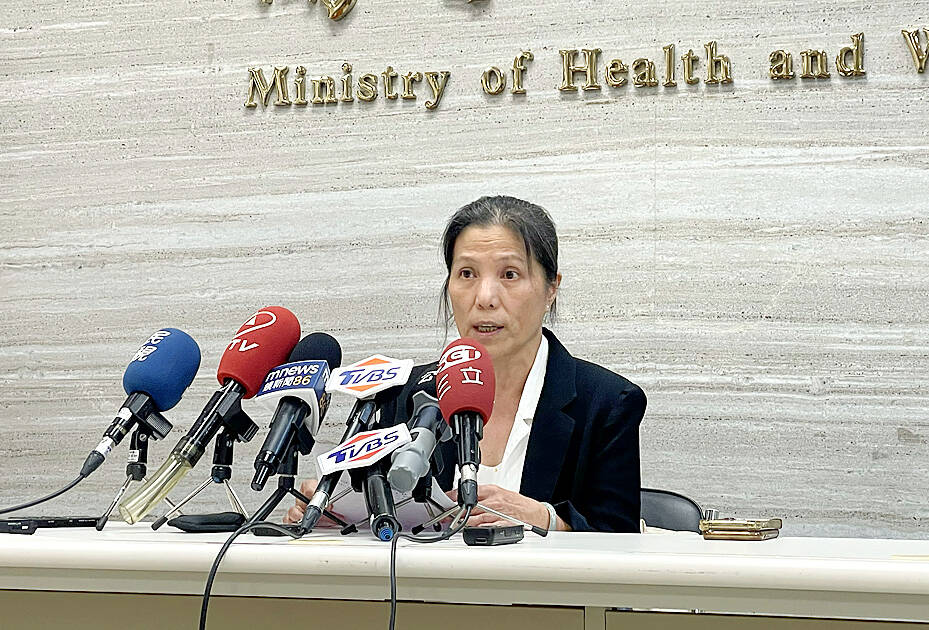The caps on bills for hospital stays are to be increased, the Ministry of Health and Welfare said yesterday, while the Social and Family Affairs Administration announced that more people would be eligible to employ foreign caregivers.
The ministry previewed proposed changes to National Health Insurance (NHI) rules to take effect on Jan. 1 next year.
Taiwanese would pay NT$50,000 (US$1,564) at most for a single hospital stay, up from NT$48,000, and NT$84,000 at most for hospital stays in a year, up from NT$80,000, Department of Social Insurance deputy head Chen Chen-hui (陳真慧) told local TV channel SET News.

Photo: Chiu Chih-jou, Taipei Times
People with a serious injury or medical condition, people from low-income families, disabled people and other disadvantaged groups are exempted from the planned hikes, Chen said.
Hospital stay copayments are adjusted as the average income changes in Taiwan, she said, citing the National Health Insurance Act (全民健康保險法).
The Directorate-General of Budget, Accounting and Statistics has published national income data in the past year, prompting the ministry to propose the changes to the rules for medical bills, she said.
NHI copayments for a one-time hospital stay are 6 percent of the average income, while accumulated copayments for hospital stays in a year are 10 percent of the average income, Chen said, citing the act.
The proposed policy change would affect an estimated 10,900 people and increase hospital revenue by NT$233.7 million, she said.
The amendments are subject to change pending a 60-day public response period, she said.
Separately, the Social and Family Affairs Administration yesterday said that the government plans to broaden eligibility requirements to employ guest workers as in-home caregivers, which would benefit 600,000 households.
The government intends to extend eligibility to include people who have had at least six months of care, score higher than one in a clinical dementia rating, or have been diagnosed with a larger variety of physical or mental conditions, Social and Family Affairs Administration Director Chien Hui-chuan (簡慧娟) said.
The proposed changes would allow people with recognized physical disabilities or rare diseases, severe breathing impairments, or moderate swallowing function loss to hire migrant workers for in-home care, Chien said.
An estimated 300,000 families with members in long-term care, 200,000 families with members with dementia and 100,000 families with members with medical impairments would be eligible to hire foreign caregivers, she said.
Not all eligible families would make use of the new rules, as many are expected to be satisfied with their current arrangements, Deputy Minister of Labor Chen Ming-jen (陳明仁) said.
The Ministry of Labor believes that 20,000 to 30,000 families would employ guest workers as in-home caregivers, he said, citing the ministry’s experience with the caregiver industry.
The proposed regulations are scheduled to be promulgated this year and efforts to secure additional supply of foreign workers are under way, he said.
People on breathing machines or intubated would no longer need to be rated according to the Barthel index to be permitted to hire in-home caregivers from abroad, said Liou Tsan-hon (劉燦宏), deputy superintendent of the Ministry of Health and Welfare’s Shuang Ho Hospital.
Barthel scale certification is being removed as a requirement due to difficulties involved in transporting patients to hospital for testing and their day-to-day care, Liou said.

SECURITY: As China is ‘reshaping’ Hong Kong’s population, Taiwan must raise the eligibility threshold for applications from Hong Kongers, Chiu Chui-cheng said When Hong Kong and Macau citizens apply for residency in Taiwan, it would be under a new category that includes a “national security observation period,” Mainland Affairs Council (MAC) Minister Chiu Chui-cheng (邱垂正) said yesterday. President William Lai (賴清德) on March 13 announced 17 strategies to counter China’s aggression toward Taiwan, including incorporating national security considerations into the review process for residency applications from Hong Kong and Macau citizens. The situation in Hong Kong is constantly changing, Chiu said to media yesterday on the sidelines of the Taipei Technology Run hosted by the Taipei Neihu Technology Park Development Association. With

CARROT AND STICK: While unrelenting in its military threats, China attracted nearly 40,000 Taiwanese to over 400 business events last year Nearly 40,000 Taiwanese last year joined industry events in China, such as conferences and trade fairs, supported by the Chinese government, a study showed yesterday, as Beijing ramps up a charm offensive toward Taipei alongside military pressure. China has long taken a carrot-and-stick approach to Taiwan, threatening it with the prospect of military action while reaching out to those it believes are amenable to Beijing’s point of view. Taiwanese security officials are wary of what they see as Beijing’s influence campaigns to sway public opinion after Taipei and Beijing gradually resumed travel links halted by the COVID-19 pandemic, but the scale of

A US Marine Corps regiment equipped with Naval Strike Missiles (NSM) is set to participate in the upcoming Balikatan 25 exercise in the Luzon Strait, marking the system’s first-ever deployment in the Philippines. US and Philippine officials have separately confirmed that the Navy Marine Expeditionary Ship Interdiction System (NMESIS) — the mobile launch platform for the Naval Strike Missile — would take part in the joint exercise. The missiles are being deployed to “a strategic first island chain chokepoint” in the waters between Taiwan proper and the Philippines, US-based Naval News reported. “The Luzon Strait and Bashi Channel represent a critical access

Pope Francis is be laid to rest on Saturday after lying in state for three days in St Peter’s Basilica, where the faithful are expected to flock to pay their respects to history’s first Latin American pontiff. The cardinals met yesterday in the Vatican’s synod hall to chart the next steps before a conclave begins to choose Francis’ successor, as condolences poured in from around the world. According to current norms, the conclave must begin between May 5 and 10. The cardinals set the funeral for Saturday at 10am in St Peter’s Square, to be celebrated by the dean of the College